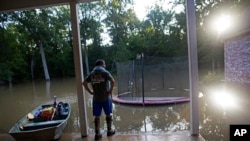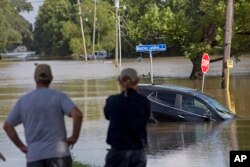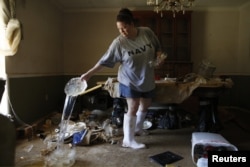U.S. Homeland Security Secretary Jeh Johnson toured recovery efforts Thursday in the Southern state of Louisiana, where unprecedented flooding has left at least 13 people dead and thousands displaced.
The flooding around Baton Rouge came from record-breaking rains of more than 75 centimeters that began last week. An estimated 40,000 homes have been damaged.
After touring flood-ravaged areas, Johnson said the federal government "will be here as long as it takes to help this community recover," and was expected to brief President Barack Obama, who is vacationing in the eastern U.S. region of New England.
On Sunday, Obama signed a Louisiana disaster declaration and ordered federal aid to the region. Governor John Bel Edwards said Thursday that more than 85,000 people had filed for federal aid in the past few days.
"In Louisiana ... we are on our way from response to recovery," Edwards said during a news conference.
Devastation
Some residents are returning to flood-ravaged homes.
"I stayed through hurricanes. I stayed through other things. This has got to be the worst," resident Moosie Benoit said.
Another resident, James Lane, said the flooding destroyed his home in Baton Rouge, a place he moved to after losing everything in Hurricane Katrina in 2005.
"I can't even think about what to do, just got to go with it as it comes, and when it's done, clean up and start all over," Lane said.
Federal Emergency Management Agency (FEMA) officials and volunteers have been on the ground for a few days, as have American Red Cross volunteers.
The Red Cross has called the flooding the worst U.S. natural disaster since Superstorm Sandy in 2012, which caused nearly $62 billion in damage.
"It's safe to say that the state in general is very accustomed to hurricanes," Craig Cooper of the Red Cross told VOA. "But this was a massive rain incident and what we've learned is that in many, many areas these were communities that have either never been flooded or they have to remember back 30 years."
Cooper said the flooding damage in the region was expected to hit about $30 million.
More than 30,000 people have been rescued since Friday. The East Baton Rouge parish sheriff's office said it had shifted from search-and-rescue mode to "public assistance and crime prevention," while officials elsewhere said rescue operations were slowing.
In addition to the vast physical and emotional damage caused by the floods, the chaotic state of Baton Rouge has lent itself to looters and scams. A nighttime curfew has been imposed in some areas.
Criticism
While several top government officials have toured the damage, Louisiana's largest newspaper, the Times-Picayune in New Orleans, criticized Obama in an op-ed, saying the president "ought to make a trip to Louisiana himself."
The White House said Thursday it was unlikely Obama would travel to the state.
Edwards, who like Obama is a Democrat, defended the administration's response to the natural disaster, saying he had spoken with the White House daily and has received quick responses for aid and other requests.
The governor said Obama can visit the state whenever he likes, but Edwards said he'd prefer the U.S. leader wait "a week or two" because such visits require local police and first responders to help block roads and provide security, something that would stress the state at this point.
VOA’s Ira Mellman and Chris Hannas contributed to this report.









